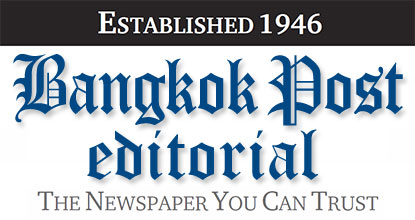
President Thein Sein and his reform government have made important changes in Myanmar. Many political prisoners are free, real steps are under way to bring in basic freedoms of speech and gathering. The elected Myanmar parliament has engaged in open dialogue and criticism, especially since the election of democracy icon Aung San Suu Kyi. The president has shown a desire to engage the world community.
While the achievements of the past two years are encouraging, Myanmar is still suffering the effects of its 60-year isolation. The country's treatment of minorities is not just outdated prejudice. It is racism and discrimination, unacceptable in 21st century Asean and the rest of the world. It is troubling that Myanmar attempts to defend its treatment of the Rohingya, Kachin, Karen and other "separate people".
Thein Sein must reverse his stance and lead Myanmar to accept and acknowledge its minorities and the country's diversity.
But there is arguably no policy so resistant to change in Myanmar as its approach to illicit drugs. As they did during the terrible times of the military junta, officials promise crackdowns, anti-drug campaigns and international cooperation, but end up doing little.
Despite the big talk, Myanmar is the world's biggest centre of methamphetamine production. And not only is it the second biggest producer of opium and heroin to Afghanistan, but Myanmar's poppy production and heroin output increased significantly last year.
Thein Sein has settled on a strange logic about these two problems. He has said, apparently sincerely, that peace pacts between his government and minorities involved in drug production would solve both civil strife and the problem of illicit drugs.
Of course, as every observant friend told him at the start, they have done neither.
Take the United Wa State Army. This often violent group signed a "peace pact" with the government in 1990. Since then, it has expanded its effective control of the ya ba market every year.
Under the military, the general acquiesced, giving the Wa a free rein to produce and export drugs so long as they refrained from war against the government.
Sad to say, the same basic policy appears to be taking place under Thein Sein. The US government declared, "The United Wa State Army is the largest and most powerful drug trafficking organisation in Southeast Asia." That was nearly five years ago, and remains true today.
Thailand knows well that fighting drug trafficking is a long, dangerous, often dirty activity. But Myanmar has not yet begun to fight. Days ago, it revealed it has pushed back its deadline to make the Shan State a drug-free zone from 2014 to 2019.
Thein Sein has not addressed the poverty of opium farmers, as he could with crop substitution and road-building programmes.
He has more troops committed to containing the Rohingya people than to fighting drug couriers. Myanmar is long on claims that it is committed to destroying major drug cartels, but short on achievements which show it is actually doing it.